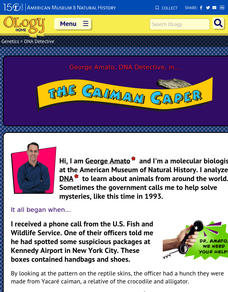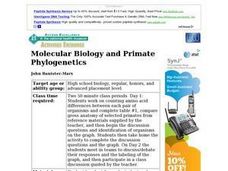Curated OER
Molecular Biology and Primate Phylogenetics
Pairs of high school biologists compare amino acid differences in the beta hemoglobin of different primates. They use the information collected to construct a phylogenic tree. Follow-up discussion questions are provided. This is a...
Alabama Learning Exchange
Phonics lesson for -ick family
Kindergarteners and first graders develop phonemic awareness for words that contain -ick. Each learner gets a stack of cards with different -ick words, highlighting the target sound as they review each one.
Curated OER
Synthetic Division Review
In this synthetic division worksheet, learners use synthetic division to divide a binomial. Explanations and examples are provided. This three-page worksheet contains ten problems, with answers.
Science-Class.net
Rock Candy Crystals
Candy is one of my favorite words, and it's an even better word when it relates to science. Yes, candy science can happen when you grow rock candy crystals with your class. The entire process for growing these edible wonders of nature is...
Shmoop
ELA.CCSS.ELA-Literacy.RI.11-12.3
Make analyzing the sequence of events in an informational text easy. Ask readers to craft a one-sentence summary of each paragraph in a document and create a text map. To demonstrate their understanding of the process, participants read...
Curated OER
Patterns Across Cultures: The Fibonacci Sequence in Visual Art
Young scholars study the origin of the Fibonacci Sequence. In this investigative instructional activity students identify works of art where Golden Spiral or Ratio appear.
Curated OER
A Hodgepodge of Literature
Students complete multiple lessons to study various literature including poetry, fiction, tall tales, and phrases. In this literature lesson, students complete six lessons about poetry, fiction, and idioms.
Curated OER
More Congruent Triangles
For this congruent triangles worksheet, 10th graders solve 6 various forms of problems that include a proof and a word problem. First, they draw and label triangles and indicate the additional pairs of corresponding parts that would have...
Curated OER
Shell Sort; Serving up Seafood
Students complete various small group activities to classify items and determine the types of combinations that can be made with these items. In the second lesson, students create menus for a restaurant to help them gain money sense and...
Curated OER
Picture This!
First graders watch the teacher model how to draw pictures and write words in a First, Next, Then, Last - 4 block graphic organizer. They write and draw in their own 4 block papers.
Curated OER
Paragraph Writing
Third graders write paragraphs. In this paragraph activity, 3rd graders discover the parts of a paragraph as they are compared to the pieces of a sandwich. They write their own paragraph to a foreign pen-pal describing our country.
Curated OER
Guided Reading -- If You Give a Mouse a Cookie
Students are read the book "If You Give a Mouse a Cookie" page by page and discuss their favorite types of cookies. They predict what they believe will happen next based on what has already happened in the story. They practice putting...
Curated OER
Finding Fibonacci
Students study and apply the Fibonacci numbers and how they occur in nature. Students solve problems using the Fibonacci numbers.
Curated OER
Worksheet: Ordering Decimals and Fractions
In this ordering decimals and fractions worksheet, young scholars rewrite fractions in the same unit and then place them in sequential order. A "how to" example is given, with step by step instructions. Eight problems are provided....
Curated OER
Worksheet 4.12, Induction
In this math worksheet, students prove given propositions for all integer values of the variable. Students use induction to prove statements true.
Curated OER
Supermarket Displays
Second graders look at the number patterns created when cans are stacked in different arrangements. The aim of the unit is for students to keep track of the numbers involved by drawing up a table of values. They are then encouraged to...
Curated OER
Numbers in Nature
Students identify numbers in nature. In this algebra activity, students solve problems using Fibonacci sequence as it is expressed in nature. They research the Fibonacci's pattern as it relates to numbers.
Curated OER
I Am Golden
Middle schoolers become familiar with patterns, the Fibonacci Sequence, and the Golden Ratio. They see how many places these occur. They have practical applications for using the calculator and making charts to extend patterns.
Curated OER
Your Day as a Cycle
Fourth graders investigate several cycles such as life cycles, and the moon cycle. They examine the sequences and patterns that are associated with daily life by keeping a daily journal for three days, and comparing it with others....
Curated OER
Jim's Table
Students analyze given number table and insert numbers working with a partner. Class share their ideas and solutions and answer specific questions about the table discussing their answers.
Curated OER
Rivers that Flow from the Continental Divide: The Journey of Two Rivers
Students explore river routes. In this social studies lesson, students trace the route of a river from its source and discuss the Continental Divide. Students draw the route the river takes and name the states it flows through. Students...
American Museum of Natural History
DNA Detective
Match up the DNA code. Pupils read the website from the American Museum of Natural History about how DNA can determine whether a skin is from a particular type of reptile. Using the same technique, learners match up products with the...
Hood River County School District
Text Structure: Features and Organization
Teach learners how to interact with both fiction and non-fiction text with a packet of activities and worksheets. After looking over text structure and the difference in text features between different types of writing,...
Curated OER
Molecular Biology and Primate Phylogenics
By counting differences in amino acids, biology stars examine the relationships between different primates. With information gleaned, they map out a phylogenic tree and discover common ancestry. You will need to create printable versions...























